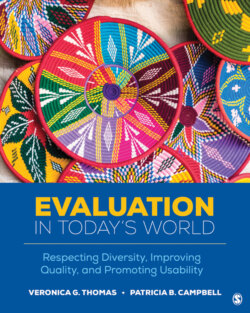Читать книгу Evaluation in Today’s World - Veronica G. Thomas - Страница 169
На сайте Литреса книга снята с продажи.
Increased Emphasis on Social Justice and Diversity
ОглавлениеProbably one of the most notable shifts in the evaluation field that gained increased prominence in the 21st century is more attention to issues of culture, social justice, and, to a lesser degree, race/racism in both evaluation theory and practice (e.g., Hood, Hopson, & Frierson, 2015; Kirkhart, 2005; Samuels & Ryan, 2011; Thomas, 2011; Thomas & Stevens, 2004; Thompson-Robinson, Hopson, & SenGupta, 2004). Even beginning in the late 1990s on into the 2000s, the AEA put forth a number of initiatives to expand attention to issues of culture, social justice, and, to a lesser degree, race/racism that will undoubtedly have a historical impact on the future of evaluation. Many of these initiatives are summarized in Table 3.4 or are discussed throughout this book and, therefore, are not presented again in this section.
An important milestone in relation to culturally responsive evaluation was the creation of the Center for Culturally Responsive Evaluation and Assessment (CREA), founded in 2013 by Stafford Hood and located in the College of Education at the University of Illinois at Urbana-Champaign. This includes an international community of scholars/practitioners who promote a culturally responsive stance in all forms of systematic inquiry including evaluation, assessment, policy analysis, applied research, and action research. The CREA hosts an annual international conference, as it seeks to produce a body of informed practitioners, published scholarship, professional development opportunities, technical assistance resources, and advocacy advancing cultural responsiveness across inquiry platforms and settings. See https://crea.education.illinois.edu/# for more information.
Culturally responsive Indigenous evaluation is another area that gained momentum in the 21st century. The culturally responsive Indigenous evaluation contribution to the field is that it provides theoretical, methodological, and practical evaluation designs and strategies for carrying out a culturally responsive evaluation of services and programs provided for and/or designed by Indigenous peoples. It began as a practical method and strategy used to include culture, language, community context, and sovereign tribal governance when conducting research, policy, and evaluation studies and emerged as a paradigm that is situated within and a partner to culturally responsive evaluations (Bowman, 2006). Culturally responsive Indigenous evaluation is intended to be a transformative evaluation model that provides flexibility to be implemented in diverse Indigenous contexts. Over the last decade, culturally responsive indigenous evaluation resources have become more readily available to academia and evaluation practitioners within the mainstream literature (Waapalaneexkweew [Bowman] & Dodge-Francis, 2018).
